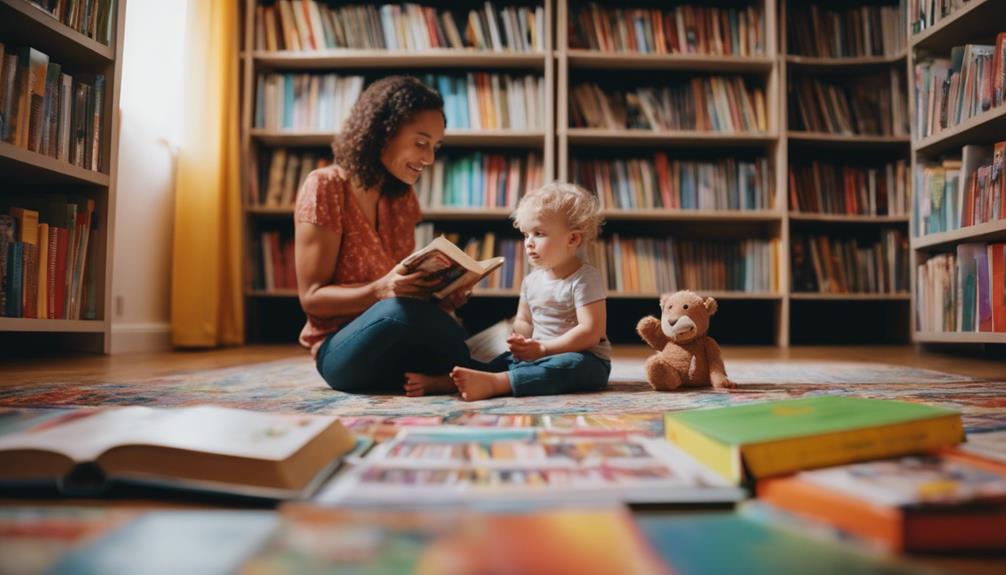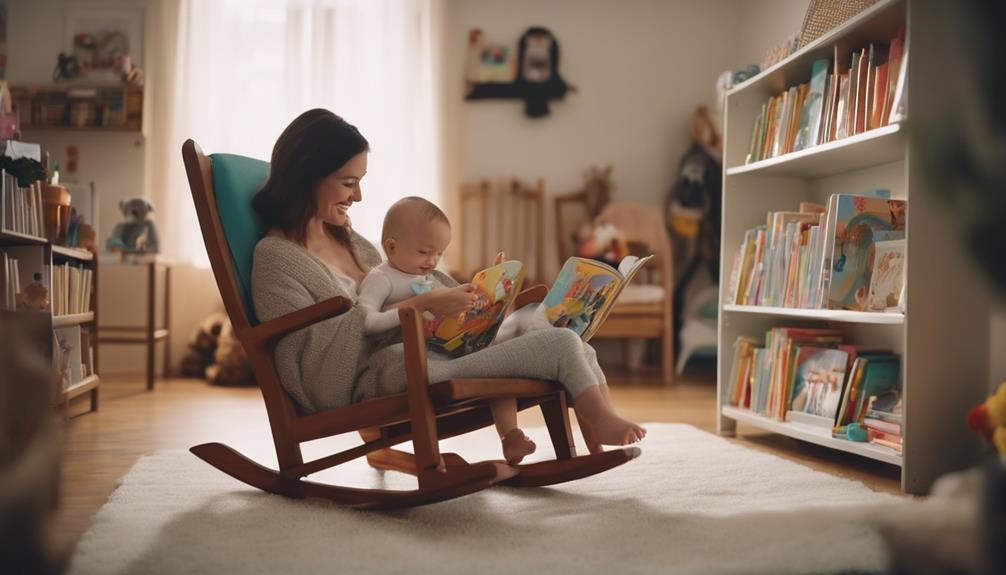You can begin reading to your baby from the moment they are born. Reading to infants introduces them to the world of books and storytelling, which helps stimulate their developing senses and enhances brain development. Opt for high-contrast picture books designed for babies aged 0-6 months to aid in their language and cognitive development. Interactive board books with simple stories are perfect for babies aged 6-12 months, as they help nurture vocabulary and language skills while strengthening the bond between parent and child. As babies grow into toddlers, interactive books can help instill a love for reading, improve language skills, and boost cognitive development. Starting early can help cultivate a lifelong love for books and learning. If you keep reading, more insights await you.
Key Takeaways
- Start reading to your baby from birth to introduce them to books and storytelling.
- Reading to newborns aids in brain development, sensory stimulation, and parent-child bonding.
- Choose high-contrast board books with interactive elements for babies aged 0-6 months.
- Babies aged 7-12 months benefit from interactive board books to enhance language development.
- Toddlers aged 13-24 months can enjoy books with simple stories to boost vocabulary and literacy skills.
Benefits of Reading to Babies
Reading to babies provides numerous benefits, including building vocabulary and pre-literacy skills for faster language development and long-term cognitive advantages. By engaging in shared reading experiences with your baby, you're laying a solid foundation for their language development and cognitive skills. Research indicates that children who are read to from a young age tend to have larger vocabularies by the time they reach three years old, giving them a head start in literacy skills.
Moreover, reading to babies not only enhances their language development but also strengthens the parent-child bond. According to a study published in the Journal of Developmental and Behavioral Pediatrics, shared reading during infancy has been linked to positive impacts on the parent-child relationship and the development of fine-motor, social, and problem-solving skills.
Reading to Newborns

When it comes to engaging with your newborn, introducing them to the world of books and storytelling can have significant developmental benefits right from the start. It's never too early to start reading to newborns.
Baby books, especially those with interactive features like textures and lift-the-flap sections, are designed to capture their attention and stimulate their developing senses. Research from 2017 suggests that reading to newborns can have long-term advantages, such as expanding their vocabulary and instilling a love for reading early on.
These early interactions not only aid in brain development but also contribute to the bond between parent and child. Fabric books, in particular, are great for newborns as they offer a tactile experience that can enhance their motor skills.
Reading to Babies 3-6 Months

When reading to babies between 3-6 months, it is important to choose books with high-contrast pictures and interactive elements. These features can help stimulate their visual development and engage their growing curiosity.
Simple stories with vivid illustrations are ideal for capturing their attention during this stage of early development.
Benefits of Reading
During the ages of 3-6 months, engaging with books can greatly benefit your baby's language and cognitive development. Reading to your baby at this early stage lays the groundwork for enhanced communication skills and stimulates their brain.
Babies at 3-6 months start to show interest in books, exploring them through touch and sound, which aids in their cognitive growth. According to the American Academy of Pediatrics, regular reading sessions with infants can lead to increased vocabulary and language comprehension.
Dr. Pamela High, a pediatrician, emphasizes the importance of reading to babies from an early age, stating, 'Reading to infants can enhance their language development and set the stage for future educational success.'
Furthermore, introducing books to your baby during this period can instill a love for reading and learning that may last a lifetime. So, take the time to read to your baby, as it not only fosters a strong parent-child bond but also nurtures their developing mind.
Interactive Reading Techniques
Engage your baby aged 3-6 months in interactive reading techniques to enhance their cognitive development and sensory skills. Pointing to pictures in the book as you read helps stimulate your baby's visual senses and encourages them to focus on the images.
Making sounds related to the story can also capture their auditory senses, making the reading experience more engaging. Using different voices and expressions while reading not only makes it more entertaining but also helps in developing your baby's cognitive skills by keeping them interested and involved in the story.
These interactive reading sessions lay a solid foundation for your baby's language development and communication skills in the future. By incorporating these techniques, you aren't only bonding with your baby but also actively contributing to their early learning experiences, setting the stage for their overall development.
Choosing Appropriate Books
For babies aged 3-6 months, selecting board books with simple illustrations and interactive features is essential for their early development. When choosing books for your little one, consider the following:
- Contrasting Colors and Patterns: Opt for books with vibrant colors and bold patterns to stimulate your baby's visual development. High-contrast images can capture their attention and support visual perception.
- Textures and Interactive Elements: Look for books with textures, crinkly pages, or lift-the-flap elements. These features can engage your baby's senses and make the reading experience more interactive.
- Engaging Features: Interactive books with mirrors, peek-a-boo flaps, and touch-and-feel elements are ideal for babies in this age range. These features not only entertain your baby but also help in their cognitive and sensory development.
Reading to Babies 6-12 Months

Reading interactive board books with simple stories and engaging illustrations to babies aged 6-12 months can greatly benefit their vocabulary and language development. By reading to your baby, you're helping to build their vocabulary and language skills at a pivotal stage of their development.
These interactive board books are designed to capture your baby's attention with colorful pictures and easy-to-follow stories. Babies at this age may start showing preferences for certain books, so it's vital to observe what captivates them.
Encouraging babies to explore books by touching, pointing, and interacting with them can further enhance their learning experience. As they engage with the books, they aren't only improving their language skills but also developing a love of reading.
According to the American Academy of Pediatrics, reading to babies aged 6-12 months strengthens the parent-child bond and sets the foundation for a lifelong appreciation of books and learning. So, take the time to read to your baby regularly to foster their language development and nurture a love for reading.
Reading to Toddlers

When reading to toddlers, it's essential to understand that they're beginning to grasp language and storytelling. By engaging them with interactive books and encouraging participation, you can foster their love for reading and improve their language skills.
Toddler Reading Benefits
Engage your toddler in regular reading sessions to boost their language skills and cognitive development. Reading to your little one, even from an early age, can have a profound impact on their brain development.
It's important to read to your baby consistently to help nurture their literacy skills. Make sure to expose your toddler to a variety of books to stimulate their curiosity and imagination.
- Reading to toddlers enhances language development, cognitive skills, and attention span.
- Toddlers who are read to regularly show improved literacy skills and vocabulary.
- Reading to toddlers promotes a love for books and storytelling.
Interactive Reading Activities
To enhance your toddler's engagement and learning during reading sessions, incorporate interactive activities that stimulate their senses and foster a love for books. Interactive reading activities play a crucial role in your baby's first year, helping them develop language skills and a passion for stories. Encourage your little one to ask questions about the pictures and characters, making the reading experience more interactive. Pointing to words and images while reading to babies can improve their understanding of language and visual cues. Make it fun by acting out scenes or even chewing on sturdy board books. Engaging in interactive reading activities not only entertains your child but also lays the foundation for a lifelong love of reading. Remember, the goal is to create a positive association with books, ensuring that reading remains an enjoyable activity for your toddler.
| Interactive Reading Activities | Benefits | Tips |
|---|---|---|
| Pointing to words and pictures | Improves language skills | Encourage your toddler to repeat words |
| Asking questions about the story | Enhances cognitive skills | Connect the story to real-life experiences |
| Acting out scenes or predicting | Promotes critical thinking | Let your toddler lead the storytelling sometimes |
Age-by-Age Guide to Reading

As your baby grows and develops, their reading preferences and abilities will change with each age milestone. When it comes to reading to babies, starting before their first birthday is beneficial for their development.
Here is an age-by-age guide to reading:
- Infants (0-6 months): High-contrast pictures and interactive features in books can captivate their attention and stimulate their visual senses.
- Babies (7-12 months): Introduce board books with sturdy pages and interactive reading sessions to encourage their participation and engagement.
- Toddlers (13-24 months): Books with a sentence or two per page can help enhance their language development, while reading familiar books can aid in learning new words and expanding their vocabulary.
Frequently Asked Questions
When Should You Start Reading to a Baby?
You should start reading to a baby as early as possible. Reading to babies enhances development and emotional well-being. Regular reading sessions build vocabulary and foster strong reading habits, so grab a book and start now!
When Can I Start Reading to My Baby While Pregnant?
You can start reading to your baby while pregnant whenever you feel ready. Many experts suggest beginning in the second trimester when your baby can hear sounds. It's a beautiful way to bond early on.
When Should You Read When You Have a Baby?
Start reading to your baby as soon as possible. Reading to babies from birth helps with brain development, vocabulary, and bonding. Make it a regular routine to enjoy the benefits of improved motor skills and a love for reading.
What Is the Earliest Age to Start Reading?
You can start reading to your baby as early as in utero. Experts recommend beginning before their first birthday for maximum benefits. Reading to babies from birth helps with vocabulary, reading habits, motor skills, and bonding.
Conclusion
To sum up, it's never too early to start reading to your baby. As the saying goes, 'The early bird catches the worm.'
Reading to newborns, infants, and toddlers not only promotes language and cognitive development but also strengthens the parent-child bond.
By incorporating reading into your daily routine, you're setting the foundation for a lifelong love of learning and literacy in your child.
So don't delay, grab a book and start reading to your little one today.










